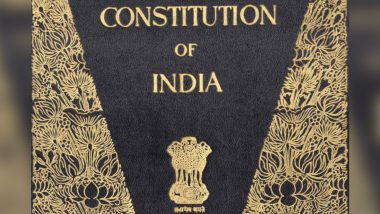New Delhi, January 26: India celebrates its Republic Day on January 26 every year to commemorate the historic moment when our nation became an independent republic country and the Constitution of India came into effect. This year, India is celebrating its 71st Republic Day. In 1949, the Indian Constituent Assembly on 26 November adopted the Constitution, which came into effect on 26 January 1950. The date - January 26 - was chosen for the Republic Day because it was on this day in 1929 when the Congress proclaimed the Declaration of Indian Independence (Purna Swaraj), rejecting the Dominion status offered by the British Regime.
The Constitution guarantees six fundamental rights to Indian citizens irrespective of their race, birthplace, religion, caste or gender. Besides fundamental rights, ten fundamental duties are also part of the Constitution under Article 51-A and citizens are expected to perform them. On India's 71st Republic Day, LatestLY complies a list of fundamental rights as well as fundamental duties that an Indian citizen has under the Constitution. Republic Day 2020 Images & HD Wallpapers For Free Download Online: Wish Happy 71st Republic Day With WhatsApp Stickers and GIF Messages.
Revisiting Our Fundamental Rights: Watch Video
List of Fundamental Rights Guaranteed Under Indian Constitution:
- Right to Equality (Articles. 14-18): It includes equality before the law without any discrimination on the grounds of religion, race, caste, gender or place of birth.
- Right to Freedom (Articles. 19-22): It includes freedom of speech and expression, assembly, association, movement and residence. It also gives freedom of right to practice any profession or occupation.
- Right against exploitation (Articles. 23-24): It prohibits all forms of forced labour, child labour and trafficking of human beings.
- Right to freedom of religion (Articles. 25-28): It includes freedom of conscience and free profession, practice, and propagation of religion and freedom to manage religious affairs.
- Cultural and Educational Rights (Articles. 29-30): It preserves the right of any section of citizens to conserve their culture, language or script
- Right to constitutional remedies (Articles. 32-35): If fundamental rights of any citizen are violated, he/she can approach the court for enforcement of his rights.
List of Fundamental Duties of Indian Citizens Under Constitution:
- To abide by the Constitution and respect its ideals and institutions, the National Flag, National Anthem;
- To cherish and follow the noble ideals which inspired our national struggle for
freedom;
- To uphold and protect the sovereignty, unity and integrity of India;
- To defend the country and render national service when called upon to do;
- To promote harmony and the spirit of common brotherhood amongst all the people of India and to renounce practices derogatory to the dignity of women;
- To value and preserve the rich heritage of our composite culture;
- To protect and improve the natural environments including forests, lakes, rivers and wildlife;
- To develop the scientific temper, humanism and the spirit of inquiry and reform;
- To safeguard public property and not to use violence; and
- To serve towards excellence in all spheres of individual and collective activity.
Besides, a new duty has been added after the passage of Right to Education Act, 2009 under which a parent or guardian has to provide opportunities for the education of his child/ward between the age of six and fourteen years. Happy Republic Day!
(The above story first appeared on LatestLY on Jan 26, 2020 08:00 AM IST. For more news and updates on politics, world, sports, entertainment and lifestyle, log on to our website latestly.com).













 Quickly
Quickly


